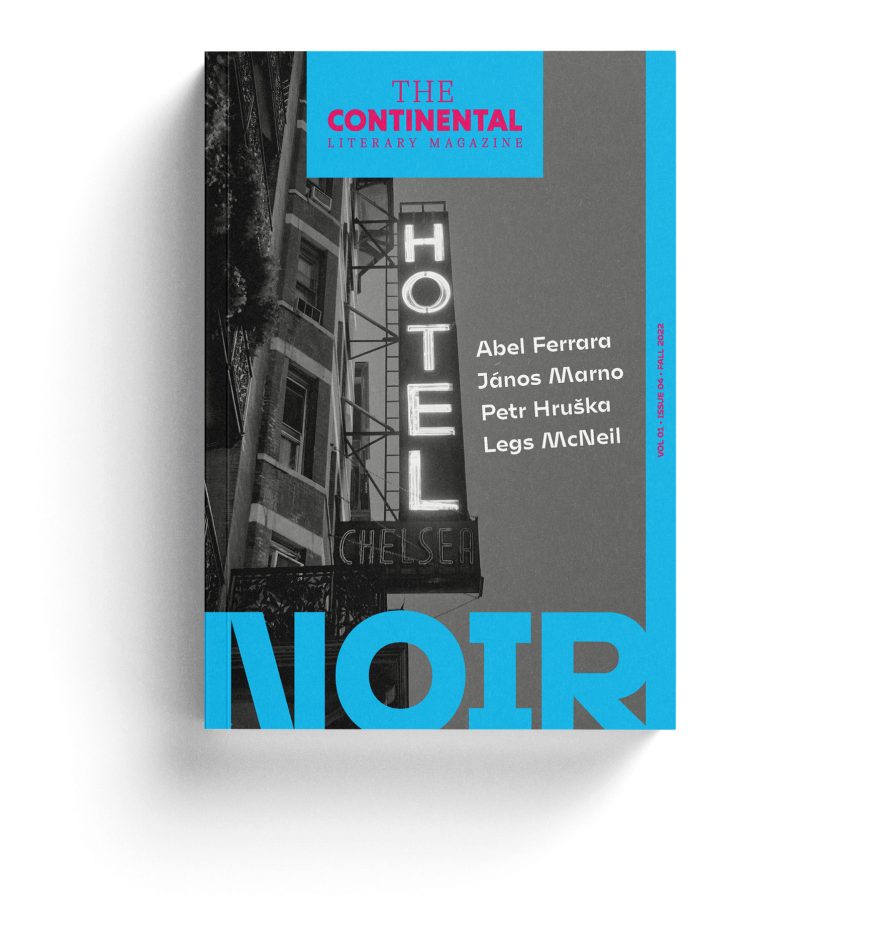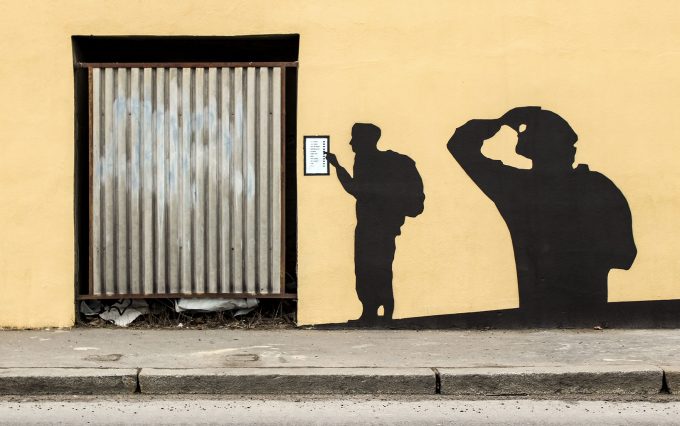
21st February 2023
Fiction
9 minutes read
Fatherlessland

21st February 2023
9 minutes read
It is 1994 and I’m hungover. Nothing surprising in this.
This is Prague less than five years after the fall of the Iron Curtain.
I am twenty-five years old. Among my Czech and international compatriots the combination of youth and the adrenaline released in the Cold War meltdown leads to seven nights of excess per week that can only be avoided or excused under the most extenuating circumstances.
I step out of my apartment building and shield my eyes from the glare of the sun. I live a block away from the Industrial Palace where the communist party congress was regularly held with a Soviet flag draped over the art nouveau steel and glass facade. I’ve been told my neighborhood is filled almost entirely with old communist functionaries – crabby, unpleasant people whose dogs fill the sidewalks with shit. It’s a weekend so the streets are empty – just the shit and me.
But after my eyes adjust I see that I’m not alone. There are two men on the other side of the street walking in my direction engaged in what looks like a pleasant chat, seemingly oblivious to my presence along with everything else. Not that I expect to be noticed. If I look as bad as I feel I don’t even want to be seen. It’s more a question of the reality of the moment, because as I said, it’s 1994, and these men are wearing SS uniforms with swastika armbands and death’s-heads on their officers’ caps. So I rub my eyes one more time, just in case.
They’re still there, real, walking and chatting away.
I can’t tell what language they’re speaking but I’m fairly sure it isn’t German, which is comforting.
Still…
Eventually they reach the end of the street, two black figures, their Nazism now indistinguishable, until they disappear altogether. It reminds me of being a kid and having a balloon slip out of my hand and the heart-wrenching feeling as I watched it vanish into the clouds though I would always keep my eyes glued to it until the bitter end when it was just a tiny, colorless speck. In this case, obviously, the anguish doesn’t come from their disappearance.
At a certain point I realize these two SS officers have to be extras coming home from working on a film but the sense of dread that makes me sick in the pit of my stomach remains, and it’s not from my hangover, though that certainly isn’t helping. Because no matter how much I dislike my neighbors, who respond to my polite greetings with naked contempt, I can’t help picturing some of these old grouches looking out their windows being pleasantly surprised at so much sun in early April, or actually grumbling even at that, but then seeing these two black-clad figures piercing the illusion of early spring.
In a neighborhood of old Czech communists what are the odds of someone having been in a concentration camp, of having memories of Nazi brutality? A lot of these people are in their 60s and 70s, so many of them would have been in their teens and twenties during the war. What if they look out on a seemingly empty street and see two SS officers? What kind of flash of terror would that provoke, however brief?
Prague is an ideal city to lose yourself in time. There are spots without a trace of modernity where you can imagine yourself centuries in the past. But to imagine yourself in the Middle Ages or Renaissance is the pleasurable kind of time travel people make movies and TV shows about. To have lived through World War II and then, almost fifty years later, look out your window and see SS officers nonchalantly strolling down the street and not know, even if just for a moment, what decade it is, that you are safe now and that the Nazis aren’t in the service of an evil dictator, but Hollywood – that is something else entirely.
Fatherland
It’s 1964. What if Hitler had won the war?
That’s the tagline of Fatherland, the TV movie I later find out these two extras were working on. It stars Rutger Hauer and Miranda Richardson in an alternative history whodunit where Germany reigns victorious over Europe but without knowledge of the Holocaust being public, at least at the film’s outset.
In the 90s, the premise for the film seems farfetched, a form of sci-fi, because now with freedom so recently achieved, Nazism’s main value is as entertainment, a distant yet clearcut villainy sunk in the dustbin of history under the more recently tossed layer of discarded Soviet communism. Hasn’t someone just declared it the end of history in their bestselling book? History is the past, and what we are living now is something new and apparently, different.
A few months later and it’s the summer of 1994 and I assume I’m done seeing SS officers on the street, an assumption that proves correct. Yet one night I’m sitting in a bar with a friend and glance out the window where the first thing I notice is a thuggish grin and insolent, rat-like eyes. He is in his late teens and is quickly surrounded by a group of similarly goonish-looking guys his age that almost entirely block the view from the bar, further darkening the already small, murky space.
But it’s the second thing I notice that’s more troubling.
The whole group of teenage boys are wearing the garb of German brown shirts, some even carrying clubs, swinging them gleefully as if preparing for a raid.
A chill descends on the bar, though just a small one. They look like real skinheads who have been hired as extras for authenticity. If they were dressed “normally”, as skinheads in their typical black and white camouflage, and were blocking the entrance like this, people would be scared because the threat of violence would be real. But they are in costume, meandering off-set from a film where they are probably being paid more in a day than they usually make in a week, so nothing will happen. Still, it’s a bad feeling, far worse than any the likely middling film will provoke.
We have the tendency to think that when something happens once it can be written off as a singular occurrence, whether that is the Holocaust, winning the lottery, or seeing uniformed Nazis on the street fifty years after the fall of the Third Reich. But when the same thing happens a second time then one is forced to look beyond mere chance.
What this second sighting means though, if it means anything, I have no idea. Eventually, the brown-shirted extras disperse, we all continue drinking our drinks and my uneasiness disperses along with the thugs.
Fathers
Growing up you gradually come to learn that one of your parents’ most vital functions is to teach you fear.
When you’re a baby they point at the stove and at fires and say things like “Hot!” and “Don’t touch!” If you had a pre-Internet childhood you were undoubtedly warned of the men driving black vans offering lollipops, men who now have the luxury of working from home.
But for children of Jewish parents born during the Holocaust the litmus test of fear was Nazis, and Nazis was a refrain my dad never hesitated in turning to, with phrases like, “When the Nazis come banging on your door!” meant to drive home the threat of anti-Semitism or tossed out in an argument about the Israeli-Palestinian conflict.
My dad wasn’t picturing me walking outside my door and seeing Gestapo officers, fake or real, though neither did he imagine me growing up and moving to the other side of the Iron Curtain, to a place mostly emptied of Jews during the war. So now I’m not sure how metaphorical his warnings were meant to be. He wasn’t talking about World War II Nazis after all, but their ideological descendants. At least I think he was.
Backdrop to war
It’s the summer of 2015 and I’m leaving my apartment and heading into the center of Prague when I see a line of trucks, cars and general, yet organized, mayhem. I don’t bother taking a closer look though I regret this later as I might have spotted Cillian Murphy and Jamie Dornan around the corner from my apartment, gun and grenade in their respective hands, on the verge of assassinating Reichsprotektor of Bohemia and Moravia, Reinhard Heydrich, in the filming of Anthropoid.
My mistake. I take a less problematic route into town and at least manage not to see any stray Nazis that day.
It’s an irony of history that Prague’s relative exemption from bombing during World War II have made it one of the best film sets in Europe, allowing it to serve as a cinematic stand-in for many other European cities. This, in turn, has led to many war films being shot on the capital’s mostly unbombed streets along with the surrounding towns and countryside.
The infamous Richard Yates-scripted The Bridge at Remagen, starring George Segal, Ben Gazzara and Robert Vaughn, not only had its filming interrupted by the 1968 Soviet invasion, but Moscow used the appearance of all the Czech extras dressed as US GIs to claim they were fending off a real-life American attack. There are the Dresden scenes in the screen version of Vonnegut’s Slaughterhouse-Five, shot in Prague in the early 70s because it looked more like wartime Dresden than the devastated German city did at that point.
The majority of Hollywood films shot here later dressed Prague up as Paris, Vienna and Berlin among other European locations, old and new.
Anthropoid was using Prague as Prague, though they moved the site of the assassination across town and had the Czechoslovak paratroopers speak accented English.
My father was born on October 24, 1942, the day the Nazis carried out one of the most brutal of the Heydrich post-assassination reprisals in which 262 friends and relatives of Anthropoid paratroopers Jan Kubiš and Josef Valčík were executed at the Mauthausen Concentration Camp. The year 1942 was also when the Final Solution was hatched.
FULL VERSION AVAILABLE IN THE PRINT EDITION







